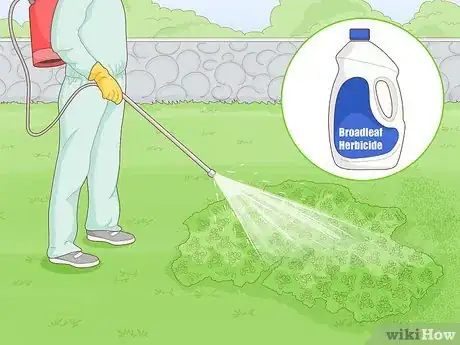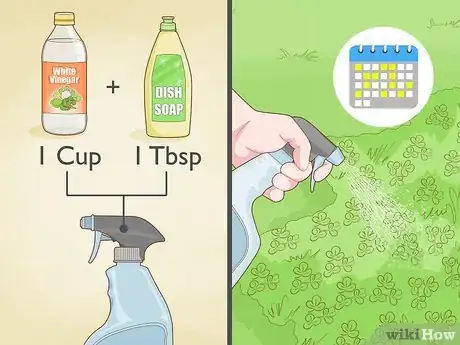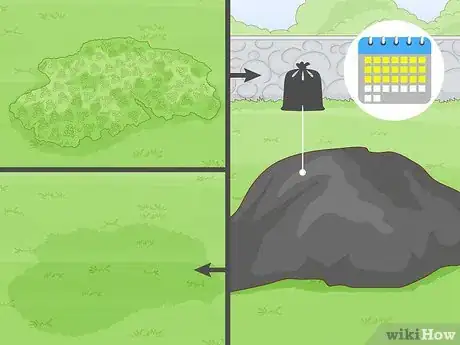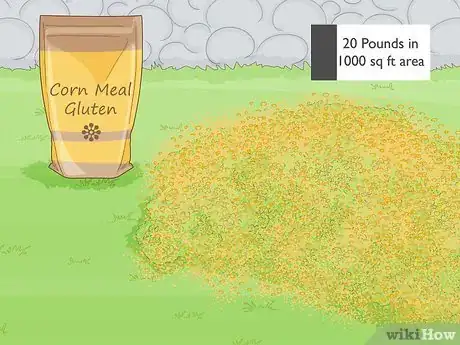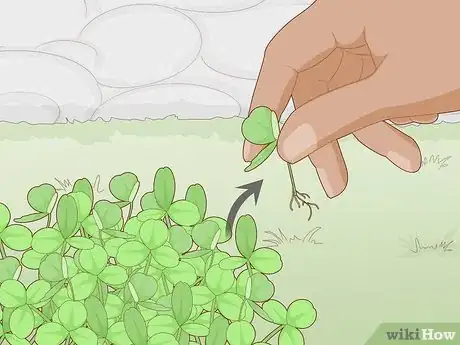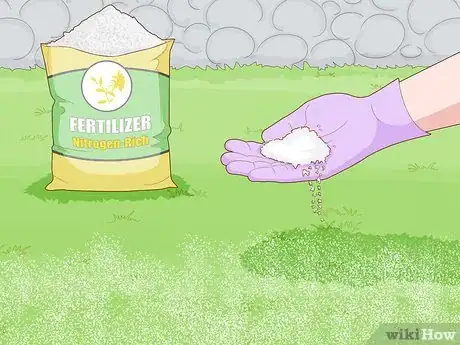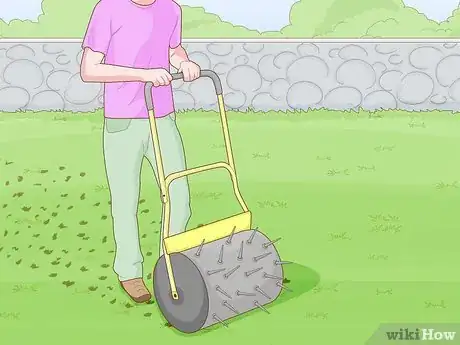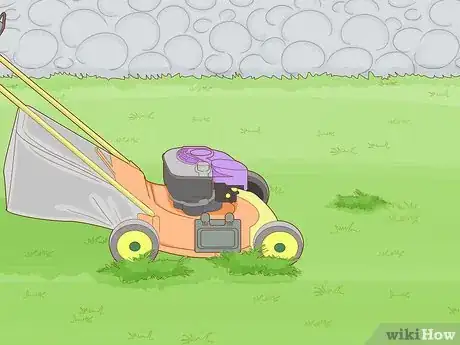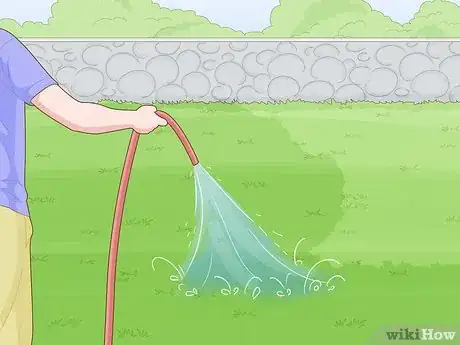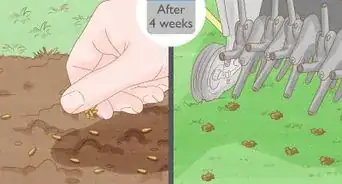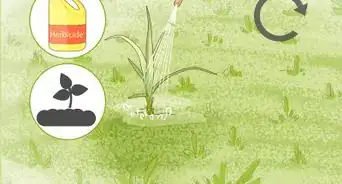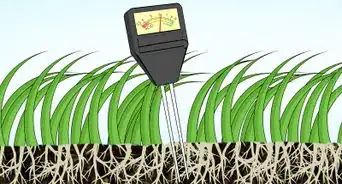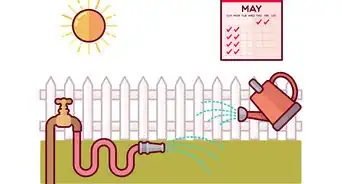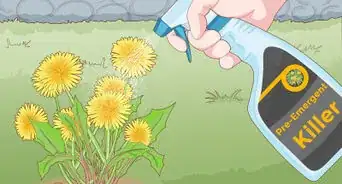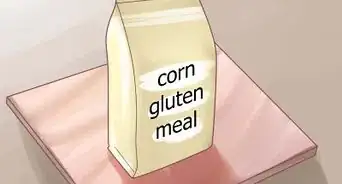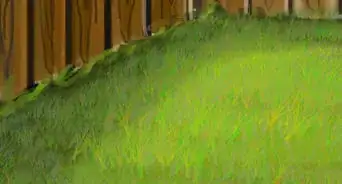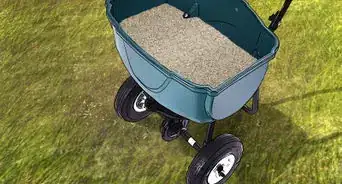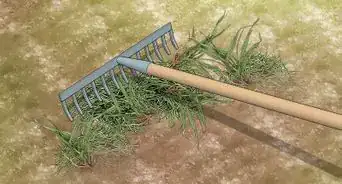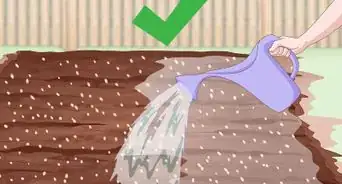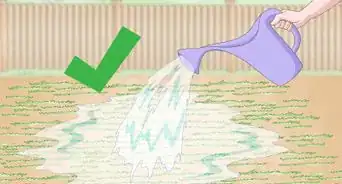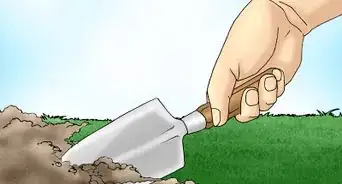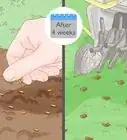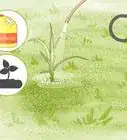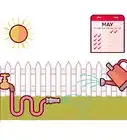This article was co-authored by Grant Wallace. Grant Wallace is a Landscaper and Owner of Grantlanta Lawn in Atlanta, Georgia. With over seven years of experience, he specializes in lawn maintenance and landscape installation. In 2012, he earned his BA from the University of West Georgia. Grant has been profiled in Shoutout Atlanta, Canvas Rebel, and Voyage ATL.
This article has been viewed 8,863 times.
If you’re sick of dealing with the clover growing on your lawn, have no fear! You can easily eliminate it and keep it from coming back. To get rid of clover that’s already on your lawn, you could use a potent herbicide to kill it, or you could make your own natural herbicide as an alternative. If you want to keep clover from setting up shop in your yard, give your lawn the TLC it needs to be healthy enough to prevent the weed from taking root.
Steps
Getting Rid of the Clover
-
1Apply a broadleaf herbicide directly to kill patches of clover. Choose an herbicide that contains Dichlorophenoxyacetic acid, Mecoprop, and Dicamba, which will kill the clover without harming the surrounding grass. Mix the herbicide with water in a sprayer according to the directions on the packaging. Apply the herbicide directly onto patches of clover on your lawn.[1]
- Broadleaf herbicide won’t harm your grass, but it can kill garden plants if it comes into contact with them.
Tip: Add a few drops of dish soap to the herbicide to help it stick to the clover leaves and kill them.
-
2Spray the clover with a vinegar and dish soap solution for a natural alternative. Make a natural herbicide by filling a spray bottle with 1 cup (240 mL) of white vinegar and add about 1 teaspoon (4.9 mL) of mild dish soap. Shake the bottle to combine the solution and spray it directly onto patches of clover to kill them without using harsh chemicals.[2]
- You may need to spray the clover 2-3 times a week with the natural herbicide to completely kill them.
- Avoid spraying any surrounding garden plants with the herbicide.
Advertisement -
3Place a plastic garbage bag over a large patch of clover to kill it. Cover larger patches of clover with black plastic garbage bags to block out the sunlight and oxygen. Secure the corners of the bag with heavy objects such as bricks or stones so it doesn’t blow away. Use a plastic bag on patches of clover only or you could also damage the surrounding grass.[3]
- It will take 2-3 weeks for the clover to completely die beneath the plastic bag.
- For giant patches of clover, use a large tarp to cover them.
-
4Spread corn meal gluten over the clover to stop it from growing. Walk around your lawn with corn meal gluten powder and cover any patches of clover with it. Spread about 20 pounds (9.1 kg) of corn meal gluten per 1,000 square feet (93 m2). Then, water your lawn well and allow it to dry naturally.[4]
- The corn gluten will stop the clover from growing any larger and won’t harm your lawn or nearby plants.
- Look for corn meal gluten at garden supply stores, nurseries, and online.
Keeping Clover from Growing
-
1Remove small clumps of clover manually to keep it from spreading. Whenever you see a small patch of clover growing on your lawn, gently loosen the soil around the roots with your hands and pull them straight out of the ground. Continue removing the clover until the entire patch is gone. Try to remove as much of the roots as you can to keep it from growing back and throw the clover away in the garbage so the seeds don’t spread.[5]
- Don’t let small clumps of clover establish themselves! As soon as you see one, pull it out of the ground.
-
2Fertilize your lawn with nitrogen-rich fertilizer to encourage your grass to grow. Keep clover from growing on your lawn by applying a nitrogen-rich weed-and-feed formula of fertilizer to make sure your soil is well-fertilized. Fertilize your lawn with a spreader to cover the area evenly so your grass will grow and repress the clover.[6]
- Look for nitrogen-rich fertilizers at garden supply stores, nurseries, and online.
Did you know?
Clover thrives in under-fertilized soil and a lawn that is healthy and rich in nutrients will help keep out many other weeds as well.
-
3Use an aerator to loosen the soil and help fertilizer penetrate it. Aerating your yard refers to the process of breaking up the soil to help air, water, and nutrients penetrate deeper into it, which makes the grass healthier and better able to choke out weeds such as clover. Take a screwdriver and stick it into your lawn. If you can’t stick it in easily, your soil is too compacted. Use a yard aerator to break up your lawn’s hard, compacted soil so it’s better able to absorb water and nutrients.[7]
- Aerating can also improve your lawn’s drainage.
- You can rent a lawn aerator from garden supply stores and home improvement stores.
-
4Keep your lawn about 3–3.5 inches (7.6–8.9 cm) tall. Mow your lawn on a higher setting to allow your grass to develop deeper, stronger root systems that can repress weed growth. Keep your lawn well-maintained to encourage the healthy growth of your grass to keep it clover-free.[8]
- Mowing the grass lower than 1.5 inches (3.8 cm) can damage the roots of your grass, making it easy for weeds such as clover to grow.
- Keeping the blades of your mower sharp can prevent the spread of fungal disease as well.
-
5Water your lawn deeply at least once a week in the early morning. Use a garden hose or a sprinkler to give your lawn a deep watering at least once a week so its healthy and well-hydrated, which will prevent clover from growing on it. Water it in the early morning to give all of the water a chance to soak in before the sun starts to heat up your lawn.[9]
- Watering your lawn also helps fertilizer reach the roots of your grass.
- Avoid overwatering your lawn, which can harm your grass and allow weeds to grow. There shouldn’t be standing water on your lawn when you water it.
Expert Interview
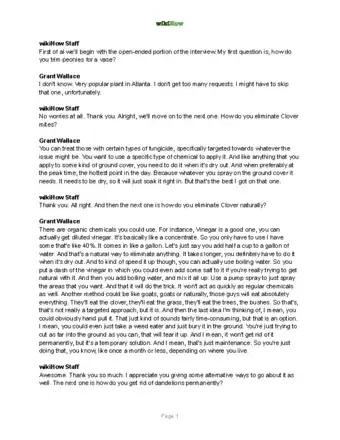
Thanks for reading our article! If you'd like to learn more about getting rid of clover, check out our in-depth interview with Grant Wallace.
References
- ↑ https://www.bhg.com/gardening/pests/insects-diseases-weeds/how-do-i-get-rid-of-clover/
- ↑ https://www.thedailygardener.com/get-rid-of-clover-in-lawn
- ↑ https://www.thedailygardener.com/get-rid-of-clover-in-lawn
- ↑ https://www.thedailygardener.com/get-rid-of-clover-in-lawn
- ↑ https://www.thedailygardener.com/get-rid-of-clover-in-lawn
- ↑ https://www.bobvila.com/articles/how-to-get-rid-of-clover/
- ↑ https://www.beyondpesticides.org/assets/media/documents/pesticidefreelawns/resources/Read%20Your%20Weeds-Organic%20Lawns.pdf
- ↑ https://www.thedailygardener.com/get-rid-of-clover-in-lawn
- ↑ https://www.beyondpesticides.org/assets/media/documents/pesticidefreelawns/resources/Read%20Your%20Weeds-Organic%20Lawns.pdf
